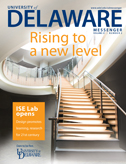In 1965, a pivotal vote for democracy

RESEARCH | About a dozen years ago, Gary May began conducting research for a book he authored on the 1965 murder of civil rights activist Viola Liuzzo in Alabama. From that point on, he says, there was no question of where his future research would take him.
“Once you ‘go South’ and write about civil rights, there’s no going back,” says May, a professor of history whose new book explores the 1965 Voting Rights Act. “There is no more interesting, no more dramatic, no more important story in American history than the story of the civil rights movement.”
Bending Toward Justice: The Voting Rights Act and the Transformation of American Democracy recounts the history of the law that enabled African Americans to overcome the obstacles and policies of intimidation that had effectively stripped them of their right to vote in many parts of the South.
Although the act authorized the federal government to intervene and protect voting rights, May says it came about not so much because of politicians but largely through the grassroots efforts of volunteers—many of them nearly forgotten today.
“What I wanted to do more than anything else was to tell the stories of the unsung heroes,” May says.
The Rev. Dr. Martin Luther King Jr. and President Lyndon Johnson are, understandably, the focus of most accounts of how the Voting Rights Act was created. However, long before 1965—May says even he was surprised to find that the beginnings of the fight went back as far as the 1930s—activists were working to register African American voters in the South and help them exercise their right to cast a ballot.

It wasn’t easy. Local voter registration workers imposed hefty poll taxes and required so-called literacy tests for African Americans that, May says, “a Harvard Ph.D. couldn’t have passed.” Registrars kept irregular hours and refused paperwork if they detected even the most minor kind of error. And would-be voters often feared for their jobs, or even their lives, if they insisted on their rights.
May’s research became particularly timely when a key section of the Voting Rights Act was struck down in a 5-4 U.S. Supreme Court decision in June. Shelby County, Ala., successfully challenged the part of the law that requires certain jurisdictions to get federal Justice Department approval before they make any changes to their election laws, as a way to ensure that the changes don’t hurt minorities. Attorneys for the county argued that the law has already accomplished its purpose and is no longer necessary.
May says his research convinced him that argument is simply wrong. He cites recent moves in various states to make voter registration more difficult and voting more restrictive.
In her dissenting opinion, Justice Ruth Bader Ginsburg cited Bending Toward Justice, and in the aftermath of the ruling, May and his book were widely quoted in the media, including The New Yorker, a nationally syndicated column by Clarence Page of the Chicago Tribune and an in-depth interview on PBS with Bill Moyers, who called May’s work “a book that could change this country again if every citizen read it.”
Article by Ann Manser, AS73






